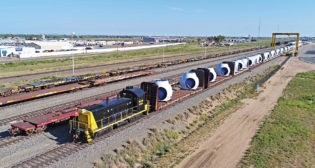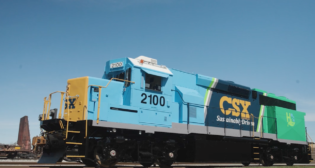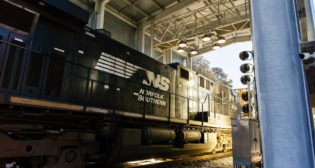
Vancouver TransLink Ordering 205 SkyTrain Cars
Written by Marybeth Luczak, Executive Editor
Of TransLink’s 205 new SkyTrain cars from Bombardier, 125 will replace first-generation MKIs and support the Broadway Subway Project; 80 will operate on the Expo and Millennium lines to improve capacity. (TransLink, Twitter)
TransLink has selected Bombardier Transportation to supply 205 new SkyTrain cars for the Expo and Millennium lines of its automated rapid transit system in Vancouver. The C$722.6 million contract will be signed in the coming days, the agency reported. Delivery of the first car is expected in 2023; all cars are slated for service by year-end 2027.
Of the 205 cars, 125 will replace first-generation Mark I vehicles and support the Broadway Subway Project, which will extend the Millennium Line 5.7 kilometers (3.5 miles). The remaining 80 will operate on the Expo and Millennium lines to improve capacity. The contract will also have an option for additional cars to support Surrey Langley SkyTrain.
The order is part of the Expo Millennium Line Upgrade Program, which is being funded with $1.47 billion through the Investing in Canada Infrastructure Program and contributions from the Government of Canada, Government of British Columbia and TransLink. A Request for Proposals was issued in July 2019.

“Almost four decades ago, our very first SkyTrain cars entered service, traveling between Vancouver and New Westminster,” TransLink CEO Kevin Desmond said. “Those first-generation trains have served our region efficiently and reliably over many years, but they are now reaching the end of their life cycle. This new order will replace our oldest trains and allow us to improve the customer experience, support expansion projects and manage our capacity well into the future.”
The order was announced at TransLink’s Dec. 17 Board meeting. The Board also approved TransLink’s 2021 budget. Among the budget report’s highlights:
• “In September 2020, the BC Government announced that under the Safe Restart Agreement, TransLink will receive C$644 million one-time operating funding relief. This funding will enable TransLink to continue providing pre-COVID service levels through 2021. These services will meet the expected demand on transit, while allowing safe physical distancing.”
• “Total consolidated revenues for 2021 are budgeted to be C$2.0 billion which is C$56.2 million lower than the 2020 budget. Included in 2021 is an estimated $282 million of Senior Government relief funding [under the Safe Restart Agreement].”
• “Expenses are budgeted at C$2.0 billion, which is C$23.2 million (1.2%) higher than the 2020 budget. TransLink has made significant reductions to expenses (C$63.3 million) to help alleviate the adverse financial impact of the pandemic. Savings were derived through not implementing planned service expansion, reduced professional fees, contracts and staffing levels, efficiencies in bus run time, reduced credit card and fare media costs, lower fuel costs, and reductions to discretionary spending. These savings helped absorb and offset the budgetary pressures mainly driven by existing inflationary increases, negotiated labour rates and existing contractual commitments pertaining to essential activities.”
• “The 2021 New Capital Program is focused on essential state-of-good-repair activities and previously committed projects, including those substantially funded by existing provincial and federal programs. Senior Government relief funding under the Safe Restart Agreement, coupled with prudent fiscal management and a healthy liquidity position, will enable TransLink to continue providing pre-COVID-19 service levels through 2021. Uncertainty around the timing of economic recovery and ridership levels continue, and a longer-term structural gap in our revenue sources will need to be addressed in the next investment plan.”



